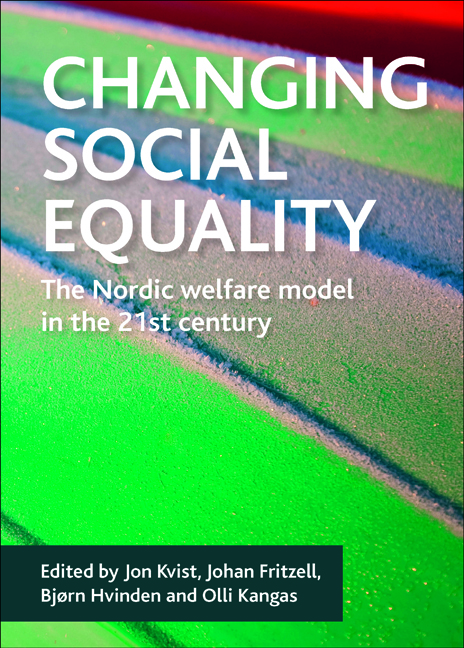Book contents
- Frontmatter
- Contents
- List of tables and figures
- Notes on contributors
- Acknowledgements
- one Changing social inequality and the Nordic welfare model
- two Anti-immigration attitudes, support for redistribution and party choice in Europe
- three Do we all (dis)like the same welfare state? Configurations of public support for the welfare state in comparative perspective
- four Eroding minimum income protection in the Nordic countries? Reassessing the Nordic model of social assistance
- five Equality in the social service state: Nordic childcare models in comparative perspective
- six Welfare state institutions, unemployment and poverty: comparative analysis of unemployment benefits and labour market participation in 15 European Union countries
- seven Social inequalities in health: the Nordic welfare state in a comparative context
- eight Income inequality and poverty: do the Nordic countries still constitute a family of their own?
- nine Is immigration challenging the economic sustainability of the Nordic welfare model?
- ten Nordic responses to rising inequalities: still pursuing a distinct path or joining the rest?
- Index
five - Equality in the social service state: Nordic childcare models in comparative perspective
Published online by Cambridge University Press: 01 September 2022
- Frontmatter
- Contents
- List of tables and figures
- Notes on contributors
- Acknowledgements
- one Changing social inequality and the Nordic welfare model
- two Anti-immigration attitudes, support for redistribution and party choice in Europe
- three Do we all (dis)like the same welfare state? Configurations of public support for the welfare state in comparative perspective
- four Eroding minimum income protection in the Nordic countries? Reassessing the Nordic model of social assistance
- five Equality in the social service state: Nordic childcare models in comparative perspective
- six Welfare state institutions, unemployment and poverty: comparative analysis of unemployment benefits and labour market participation in 15 European Union countries
- seven Social inequalities in health: the Nordic welfare state in a comparative context
- eight Income inequality and poverty: do the Nordic countries still constitute a family of their own?
- nine Is immigration challenging the economic sustainability of the Nordic welfare model?
- ten Nordic responses to rising inequalities: still pursuing a distinct path or joining the rest?
- Index
Summary
Introduction
The Nordic countries are renowned for high levels of both equality and tax-funded social service provision. Equality and services are linked by the roles that extensive provision of services plays in enabling women's labour market participation and in ensuring that the capacity to pay does not determine access to services. The connection between institutional structures and equality achievements led Jorma Sipilä to argue in the mid-1990s that social care services are the key to the Scandinavian welfare model. Although Sipilä's argument has since been challenged (see, for example, Rauch, 2007), any reassessment of the Nordic welfare model would not be comprehensive without some analysis of social services.
This chapter examines the place of childcare in the Nordic welfare model since the 1990s. We recognise that a more encompassing assessment of social services as a system would include care of older people and those with disabilities, and would reveal complex patterns of differential development between care fields (Anttonen et al, 2003; Rauch, 2007). However, as such a comprehensive analysis is beyond the scope of this chapter, we focus on change in the organisation and distribution of childcare and related measures in the four largest Nordic countries. We also use data from the European Union Statistics on Income and Living Conditions (EU-SILC) to compare the Nordic situation to developments in other European countries with different family policy systems. Our aims are to understand whether and, if so, how policy-induced shifts in the boundaries between the state, market and family have affected social groups differently and to assess the equality achievements and challenges of the Nordic model from a comparative perspective.
Childcare and equality: making the links
Tax-funded services certainly lie at the centre of the Nordic response to family needs for support in caring for children, as Sipilä suggests. However, in Nordic countries and elsewhere, other policy measures also contribute to meeting care needs. The scale, design and mix of these other measures, along with childcare services, together determine the overall equality outcomes of family policies. In addition to services, which provide directly for care needs, governments use one or more of the following measures to make provision for care: monetary benefits, employment-related benefits and incentives for employment creation or market provision (Daly, 2002). This chapter focuses on two of these measures: services and financial benefits (specifically, care allowances).
- Type
- Chapter
- Information
- Changing Social EqualityThe Nordic Welfare Model in the 21st Century, pp. 89 - 118Publisher: Bristol University PressPrint publication year: 2011



